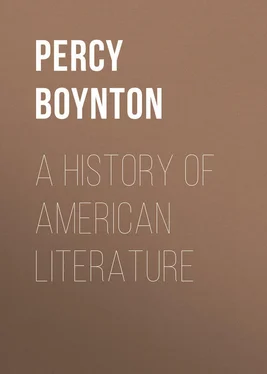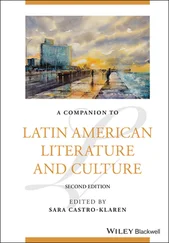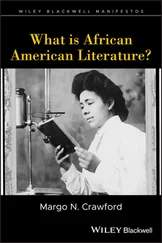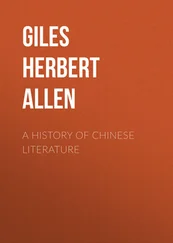Percy Boynton - A History of American Literature
Здесь есть возможность читать онлайн «Percy Boynton - A History of American Literature» — ознакомительный отрывок электронной книги совершенно бесплатно, а после прочтения отрывка купить полную версию. В некоторых случаях можно слушать аудио, скачать через торрент в формате fb2 и присутствует краткое содержание. Жанр: foreign_antique, foreign_prose, на английском языке. Описание произведения, (предисловие) а так же отзывы посетителей доступны на портале библиотеки ЛибКат.
- Название:A History of American Literature
- Автор:
- Жанр:
- Год:неизвестен
- ISBN:нет данных
- Рейтинг книги:4 / 5. Голосов: 1
-
Избранное:Добавить в избранное
- Отзывы:
-
Ваша оценка:
- 80
- 1
- 2
- 3
- 4
- 5
A History of American Literature: краткое содержание, описание и аннотация
Предлагаем к чтению аннотацию, описание, краткое содержание или предисловие (зависит от того, что написал сам автор книги «A History of American Literature»). Если вы не нашли необходимую информацию о книге — напишите в комментариях, мы постараемся отыскать её.
A History of American Literature — читать онлайн ознакомительный отрывок
Ниже представлен текст книги, разбитый по страницам. Система сохранения места последней прочитанной страницы, позволяет с удобством читать онлайн бесплатно книгу «A History of American Literature», без необходимости каждый раз заново искать на чём Вы остановились. Поставьте закладку, и сможете в любой момент перейти на страницу, на которой закончили чтение.
Интервал:
Закладка:
To return to “The Sketch Book.” By 1818, three years after Irving had gone abroad for the second time, the business in which he had been engaged with his brothers had utterly failed, and he was forced to regard writing not merely as an attractive way of diverting himself but as a possible source of income. The new articles which he then wrote, together with many which had been accumulating in the leisure of his years in England, were soon ready for publication, but they found no English publisher ready to risk putting them out. Even the powerful influence of Sir Walter Scott, Irving’s cordial friend, could not prevail at first with John Murray, “the prince of publishers.” In 1819 Sidney Smith’s contemptuous and famous query, “Who reads an American book?” was fairly representative of the English-reading public. Murray was interested in Irving’s manuscript, but did not see any prospect of selling enough books to justify the risk of publication. Irving had wanted the indorsement of Murray’s imprint to offset the severity of the kind of English criticism deplored years earlier by John Trumbull (see p. 111). As soon, however, as the sketches were printed in New York in a set of seven modest installments, the attention of English readers was attracted to them, and Irving heard rumors that a “pirated” English edition was to appear. There was no international copyright in those days, and no adequate one until as late as 1899; so that a book printed on one side of the Atlantic was fair game for anyone who chose to steal it on the other. If an author wanted his works to appear correctly and to get his full money return for them, it was necessary for him to go through all the details of publishing independently in both countries. After a great deal of difficulty, therefore, Irving contrived to get out an English edition through an inefficient publisher, but the success of it was so marked that Murray soon saw the light and from then on was eager to get the English rights for everything that Irving wrote and to pay him in advance five, ten, and, in one case, as much as fifteen thousand dollars.
With the appearance of “The Sketch Book” England arrived at a new answer for Sidney Smith’s question. Irving was sought as a celebrity by the many, in addition to being loved as a charming gentleman by his older friends. Few tributes are more telling than that contained in a letter written many years later by Charles Dickens in which he refers to the delight he took in Irving’s pages when he was “a small and not over particularly well taken care of boy.” Even the austere Edinburgh Review indorsed the American as a writer of “great purity and beauty of diction.” From the most feared critic in the English-speaking world to the neglected boy whose father was in debtors’ prison Irving received enough applause quite to turn the head of a less modest man.
“The Sketch Book” includes over thirty papers of four or five different kinds. About fifteen are definite observations on English life and habits as seen in country towns and on country estates. Of the remainder six are literary essays of various kinds; four are in the nature of personal traveling reminiscences; three are the famous short stories – “Rip Van Winkle,” "Sleepy Hollow,“ and the ”The Spectre Bridegroom"; and five so far defy classification as to fall under the convenient category of “miscellaneous.”
As a document in literary history the sixth paper deserves far more notice than is usually conceded to it, for as a rule it is totally neglected. This is entitled “British Writers on America.” The tone of English literary criticism has already been referred to. Irving called attention to the fact that all English writings on America and the Americans were equally ill-natured. He pointed out that ordinarily English readers demanded strictest accuracy from author-travelers; that if a man who wrote a book on the regions of the Upper Nile or the unknown islands of the Yellow Sea was caught in error at a few minor points, he was held up to scorn as careless and unreliable, and another English traveler who could convict him of mistakes or misstatements could completely discredit him. But in marked contrast to this, no such scrupulousness was demanded of visitors to the United States. Books on the new nation in the Western World were written and read to satisfy unfriendly prejudice rather than to supply exact information and honest opinion. Against a continuation of such a practice Irving gave warning, not merely because it was uncharitable but because in time it would estrange the two peoples and lose for England a friend with whom she could not afford to be at loggerheads.
Is all this to be at end? Is this golden band of kindred sympathies, so rare between nations, to be broken forever? Perhaps it may be for the best. It may dispel an illusion which might have kept us in mental vassalage; which might have interfered occasionally with our true interests, and prevented the growth of proper national pride. But it is hard to give up the kindred tie! and there are feelings dearer than interest – closer to the heart than pride – that will make us cast back a look of regret as we wander farther and farther from the paternal roof, and lament the waywardness of the parent that would repel the affections of the child.
There were probably many other Americans capable of making the warning prophecy so notably fulfilled nearly a hundred years later, though few, perhaps, who would have put it in such temperate language; but Irving went further in following with a warning to his fellow-countrymen:
Shortsighted and injudicious, however, as the conduct of England may be in this system of aspersion, recrimination on our part would be equally ill-judged… Let us guard particularly against such a temper, for it would double the evil instead of redressing the wrong. Nothing is so easy and inviting as the retort of abuse and sarcasm, but it is a paltry and unprofitable contest… The members of a republic, above all other men, should be candid and dispassionate. They are, individually, portions of the sovereign mind and sovereign will, and should be enabled to come to all questions of national concern with calm and unbiased judgments… Let it be the pride of our writers, therefore, discarding all feelings of irritation, and disdaining to retaliate the illiberality of British authors, to speak of the English nation without prejudice and with determined candor.
If there is any justification for calling an American essay “The American Declaration of Literary Independence” the title should be conferred on this neglected number in “The Sketch Book.” It was long before either English or American writers were wise enough to follow Irving’s counsels, but he himself was always as tactful as he was honest.
“The Sketch Book” as a whole, then, can best be understood as an American’s comments on English life and custom, made at a time when “the retort of abuse and sarcasm” would have been quite natural. In the opening paper, as well as in the sixth, there is a gentle reminder that the literary east wind had felt rather sharp and nipping in New York. Irving is describing himself after the fashion of the eighteenth-century essayists at the introduction of a series, and at the end indulges in this little nudge of irony:
A great man of Europe, thought I, must … be as superior to a great man of America, as a peak of the Alps to a highland of the Hudson; and in this idea I was confirmed by observing the comparative importance and swelling magnitude of many English travelers among us, who, I was assured, were very little people in their own country. I will visit this land of wonders, thought I, and see the gigantic race from which I am degenerated.
His summarized impressions of the typical Englishman are contained in the thirtieth paper, on “John Bull.” This keen analysis will bear the closest reading and study, and the more one knows of English history the more interesting it becomes. In this respect it is like “Gulliver’s Travels,” for it is full of double meanings. To the inattentive or the immature it is simply a picture of a bluff, hearty, quick-tempered, over-conservative average English country gentleman, but to the intelligent and attentive reader this gentleman turns out to be the embodiment of the English government and the British Empire. The character of Parliament, the relation between Church and State, the condition of the national treasury, the attitude of the rulers toward reform legislation and toward the colonies, dependencies, and dominions are all treated with kindly humor by the visiting critic. The picture is by no means a flattering one, but it was Irving’s happy gift to be able to indulge in really biting satire and yet to do so in such a courteous and friendly way that his words carried little sting. Part of the concluding paragraph to this essay will illustrate his method of combining justice with mercy:
Читать дальшеИнтервал:
Закладка:
Похожие книги на «A History of American Literature»
Представляем Вашему вниманию похожие книги на «A History of American Literature» списком для выбора. Мы отобрали схожую по названию и смыслу литературу в надежде предоставить читателям больше вариантов отыскать новые, интересные, ещё непрочитанные произведения.
Обсуждение, отзывы о книге «A History of American Literature» и просто собственные мнения читателей. Оставьте ваши комментарии, напишите, что Вы думаете о произведении, его смысле или главных героях. Укажите что конкретно понравилось, а что нет, и почему Вы так считаете.











